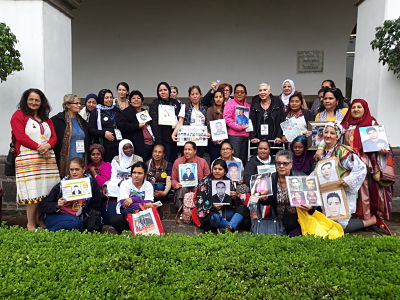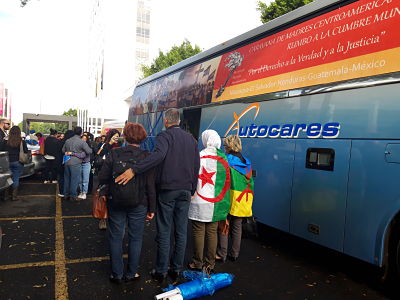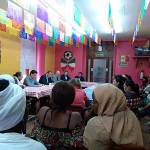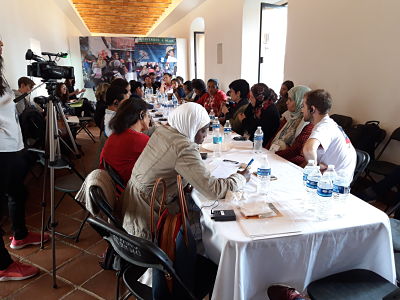
FIELD REPORT
This November was the first time when mothers and other relatives of the disappeared migrants from different countries gathered together to share their grief, stories and demands concerning their family members who had disappeared while migrating. The attending relatives had lost the connection of their family members in the two of the most dangerous migrant routes in the world, the Mexico – United States border and the Mediterranean Sea between Africa and Europe.
The families attending the event came from Algeria, El Salvador, Guatemala, Honduras, Mauritania, Mexico, Nicaragua, Senegal and Tunisia. In addition to the families, there were activists and volunteers from Italy, Mexico, Spain and United States participating in the summit. The main purpose of the summit was to raise awareness of migrant disappearances as a worldwide phenomenon and to unite the families searching for their disappeared family members.

The three-day event was organized in connection with the 8th World Social Forum on Migrations in Mexico City in 2.-4.11.2018. The main organizer of the summit was a social movement called Movimiento Migrante Mesoamerica (MMM), which concentrates its work on migrants’ rights and on expanding the social and political solidarity concerning migration. One of the main actions of MMM is its yearly caravan of the mothers of Central American migrants who have disappeared in Mexico. This year the caravan went through 12 cities on the regular migration route in Mexico and coincided with the other migrant caravan that left Honduras earlier in November 2018.
The meeting with the General Attorney of Mexico
The day before the summit, the participants of the caravan met with the representatives of the General Attorney’s Office of Mexico (Procuraduría General de la República, PGR). The mothers requested the PGR to pay more attention to the indirect victims of the disappearances (the Central American families) and asked the personnel of the PGR to visit the countries of origin of the disappeared migrants. This way the families would receive up-to-date information about the progress of the cases reported in Mexico. It was also discussed that if the families were able to report the disappearance already in the country of origin, it would be easier for the families who are not able to travel to Mexico.

Other topics addressed in the meeting were the lack of measures taken by the Mexican authorities and the irregularities of the PGR prohibiting the progress of the investigations of the disappearances. The families have for example noted incorrect photos of the disappeared in the reports, and that the investigators are not answering phone calls to give information about the investigation progress. In response, the representatives of the PGR gave their personal contact details to the attending families so that they could be in contact with the representatives in their inquiries in person.
The three-day summit of the Mothers as a channel for self-help and empowerment
Two days before the summit, there was a common gathering for the participants, followed by an opening ceremony with the local government representatives and the Mexican media where the attendees witnessed a meeting with a mother and her missing son after 13 years. The first day of the actual summit started with the presentation of the Mexican representative of The Office of the United Nations High Commissioner for Human Rights (OHCHR) and presentations given by various non-governmental organizations. The OHCHR representative emphasized the responsibility of the governments and institutional cooperation in the search of the missing migrants. The representative also stated that the current policies consider migrants as “dangerous objects” and that the movement through transit countries is difficult due to disappearances, homicides and kidnappings taking place while on the road.
The afternoon of the first day of the summit was dedicated to the participating families and their delegations as well as non-governmental organizations. During the second day the families’ discussed their experiences in the handling of grief, searching for the missing persons and communication with the governments. Many of the mothers did not know about the scope of the disappearances before the summit, and concluded that the event was empowering for them because they realized that they are not alone in their concern. The families think that they are not helped or supported in their countries of origin and that they have no choice but to take matters into their own hands. Besides raising awareness, the gathering in Mexico was also a way to search for the family members and to learn new means to conduct the search.

On the last day of the summit, the participants drafted the “Manifest of the Mothers to the World” (Manifiesto de las Madres al Mundo) and decided on the future steps to be taken on the basis of the first summit. The possible future steps included the organization of a worldwide network of families looking for their missing relatives and an international platform for searching. The overall aim of the summit and manifest was also to start a collective action to decriminalize migrants and those who try to search for the missing migrants and solidarity activists supporting them.
